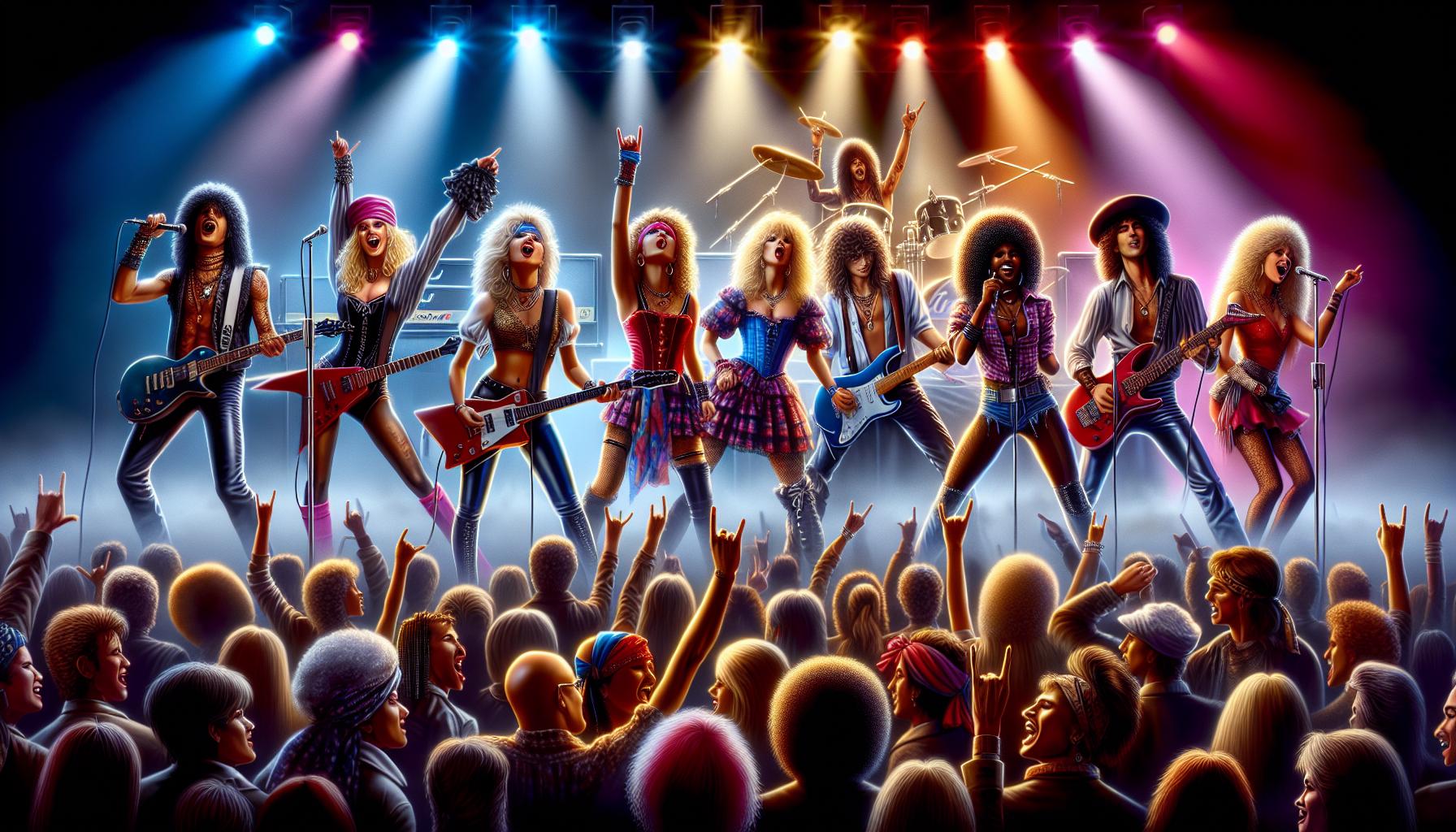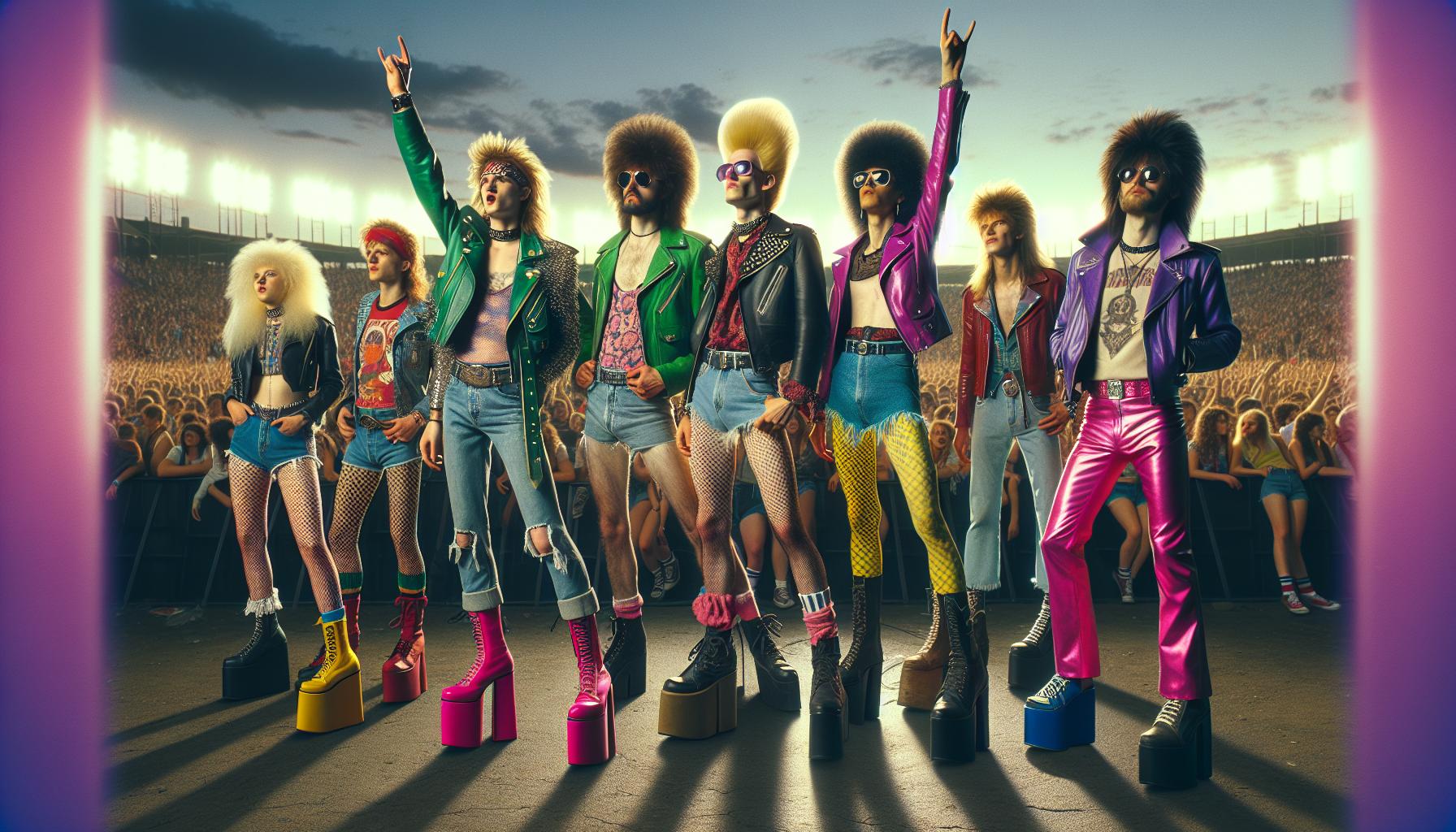The ’80s were a vibrant time for rock music, bursting with energy and creativity that defined a generation. From the electrifying guitar riffs to the unforgettable anthems, this era brought us some of the most iconic bands and artists that still resonate today. Whether you were headbanging at a concert or blasting tunes in your car, the sounds of the ’80s shaped the musical landscape in ways we still feel. As I dive into the heart of ’80s rock, I’ll explore the genre’s evolution, its cultural impact, and the legendary figures who made it unforgettable. Get ready to relive the magic of this dynamic decade and discover why ’80s rock continues to inspire new music and fans alike.
- Dynamic Genre Variety: The ’80s rock scene spanned multiple genres including hard rock, glam metal, and alternative rock, each contributing unique sounds and cultural influences.
- Influential Artists: Iconic bands like Guns N’ Roses, Bon Jovi, and U2 defined the decade with their powerful anthems and innovative styles, leaving a lasting impact on rock music.
- Cultural Significance: ’80s rock music profoundly influenced fashion trends, visual media through music videos, and social movements, shaping a distinct identity that resonates today.
- MTV’s Role: The launch of MTV revolutionized how artists connected with fans, emphasizing the importance of visually engaging music videos as part of their promotional strategies.
- Enduring Legacy: The influence of ’80s rock is evident in modern music, with contemporary artists drawing inspiration from the decade’s sound and aesthetics, ensuring its continued relevance and revival in popular culture.
80 Rock Music
’80s rock music represents a dynamic period marked by diverse genres and styles. Artists such as Bon Jovi, Guns N’ Roses, and Def Leppard dominated the charts, blending powerful vocals, catchy melodies, and intricate guitar work. The emergence of subgenres like glam rock, hard rock, and heavy metal showcased a wide range of sound and aesthetic.
Iconic bands shaped the musical landscape. U2 brought ethereal soundscapes and socially conscious lyrics. Metallica revolutionized heavy metal with complex compositions and aggressive energy. Meanwhile, heartland rock artists like Bruce Springsteen captured the essence of American life through storytelling.
MTV’s launch in 1981 played a crucial role in popularizing rock music. Music videos became essential for artists to connect visually with fans. This visual medium elevated the status of entertainers, prompting elaborate stage shows and theatrical performances.
The cultural impact of ’80s rock music remains significant. It influenced fashion trends, inspired youth movements, and provided a soundtrack for social change. Festivals like Live Aid in 1985 united artists and fans alike, emphasizing rock music’s ability to create connections across global audiences.
The legacy of ’80s rock continues to resonate in contemporary music. Modern artists draw inspiration from this era, ensuring that its vibrant spirit endures. Understanding the elements and figures from this period reveals the foundation of today’s rock music.
Key Genres and Styles

The ’80s rock music scene featured a variety of genres and styles that shaped its identity. Each genre brought unique sounds and cultural influences, contributing to the era’s dynamic nature.
Hard Rock
Hard rock dominated the ’80s with its powerful riffs and energetic performances. Bands like AC/DC and Aerosmith defined this genre through explosive guitar work and gritty vocals. Notable albums such as “Back in Black” by AC/DC and “Permanent Vacation” by Aerosmith showcased hard rock’s appeal and commercial success. This genre’s emphasis on electric guitar solos and driving rhythms continues to influence modern rock, proving its lasting legacy.
Glam Metal
Glam metal emerged in the ’80s, combining hard rock intensity with flamboyant fashion. Bands like Mötley Crüe and Poison captivated audiences with their catchy hooks and theatrical performances. With their glitzy attire and bold hairstyles, glam metal bands created a visual spectacle, complementing their sound. Iconic albums such as “Dr. Feelgood” and “Look What the Cat Dragged In” exemplified this genre’s appeal. Glam metal played a vital role in defining the pop culture of the decade, leaving a significant mark on both music and fashion.
Alternative Rock
Alternative rock began gaining traction in the late ’80s, pushing the boundaries of mainstream music. Bands like R.E.M. and The Smiths introduced a more introspective sound that contrasted with the flamboyance of glam metal. Their thought-provoking lyrics and innovative melodies attracted a dedicated following. Albums like “Murmur” by R.E.M. showcased the genre’s distinct voice and laid the groundwork for the ’90s alt-rock explosion. Alternative rock’s emphasis on authenticity and self-expression resonated with fans, helping to diversify the rock landscape.
Influential Bands and Artists

The ’80s rock scene featured several influential bands and artists that shaped the genre’s identity. Their contributions highlight the creativity and diversity of the decade’s music.
Guns N’ Roses
Guns N’ Roses burst onto the scene with their debut album “Appetite for Destruction” in 1987. This landmark album, which sold over 30 million copies worldwide, redefined hard rock with its raw sound and unabashed lyrics. The band’s members, particularly vocalist Axl Rose and guitarist Slash, became iconic figures owing to their electrifying performances and unique styles. Hits like “Sweet Child O’ Mine” and “Welcome to the Jungle” showcased their blend of punk rock energy and heavy metal grit, influencing countless bands in subsequent years.
Bon Jovi
Bon Jovi achieved massive fame in the ’80s with their anthemic rock sound, epitomized by their album “Slippery When Wet” in 1986. Featuring chart-topping hits like “Livin’ on a Prayer” and “You Give Love a Bad Name,” the album sold over 28 million copies globally. The band’s catchy melodies, combined with Jon Bon Jovi’s charismatic stage presence, helped them connect with a wide audience. Their ability to blend rock with pop elements allowed them to soar to the top of the charts and maintain relevance in the changing musical landscape.
U2
U2 emerged as a defining force in rock music during the ’80s, known for their anthemic sound and socially conscious lyrics. Their 1987 album “The Joshua Tree” played a pivotal role in their rise, featuring hits like “With or Without You” and “I Still Haven’t Found What I’m Looking For.” The band’s experimentation with genres, musical innovation, and Bono’s distinctive voice solidified their status in rock history. U2’s commitment to social issues and humanitarian efforts further distinguished them, allowing their music to resonate deeply with audiences worldwide.
Cultural Impact of 80 Rock Music

The cultural impact of ’80s rock music extends beyond sound, influencing fashion, visual media, and social movements. This era created a distinct identity that shaped generations and continues to inspire today.
Fashion Trends
Fashion trends during the ’80s rock era featured bold styles and flamboyance. Artists like David Bowie and Mötley Crüe popularized spandex, leather jackets, and wild hairstyles, setting a standard for rock fashion. The glam metal scene embraced bright colors, glam makeup, and accessories, characterized by excessive jewelry and platform boots. This stylization became emblematic of the rock lifestyle, inspiring fans to emulate their favorite bands, thus creating a vibrant subculture.
Music Videos and MTV
Music videos revolutionized the way artists connected with fans during the ’80s. The launch of MTV in 1981 transformed promotional strategies, showcasing videos of iconic songs like “Thriller” by Michael Jackson and “Sweet Child O’ Mine” by Guns N’ Roses. Artists crafted visual narratives that complemented their music, building personas and brand identities that transcended radio. MTV not only increased artists’ visibility but also foreshadowed the significance of visual storytelling in music, influencing future generations of artists. The synergy between music and video solidified a new standard for engagement in the rock genre, leaving a lasting legacy on pop culture.
Legacy of 80 Rock Music
The legacy of ’80s rock music remains profound, continuing to shape the sound and culture of contemporary music. As generations embrace this iconic era, its influence is evident across genres and in mainstream culture.
Continued Influence on Modern Rock
Modern rock music reflects the impact of ’80s rock through production techniques, songwriting, and performance styles. Bands like Foo Fighters and The Killers incorporate melodic hooks and powerful riffs reminiscent of the ’80s sound. The anthemic qualities of U2 and Bon Jovi persist in the works of current artists, fostering a connection between past and present. Additionally, the resurgence of guitar-driven music signifies a shift back to the roots laid down during this dynamic decade, highlighting the genre’s enduring relevance.
Revival and Nostalgia
Revival and nostalgia for ’80s rock music thrive in popular culture today. Tribute bands consistently fill venues, delivering authentic renditions of classic hits. Festivals featuring ’80s acts attract large audiences seeking to relive the experience of a bygone era. Media also plays a role; movies and TV shows frequently showcase ’80s tracks, introducing the music to new audiences while sparking interest in the original artists. This cycle of revival ensures that the spirit of ’80s rock remains alive, resonating with fans old and new.
The ’80s rock era isn’t just a chapter in music history; it’s a vibrant heartbeat that continues to pulse through today’s soundscape. The creativity and energy of that decade laid the groundwork for countless artists and genres that followed.
From the electrifying riffs of hard rock to the anthems of glam metal, the influence of ’80s rock is undeniable. It’s fascinating to see how modern bands draw inspiration from this rich legacy, ensuring that the spirit of the ’80s lives on.
As I reflect on this transformative period, I can’t help but appreciate how it shaped not only music but also culture and identity. The legacy of ’80s rock will forever inspire both musicians and fans alike.



